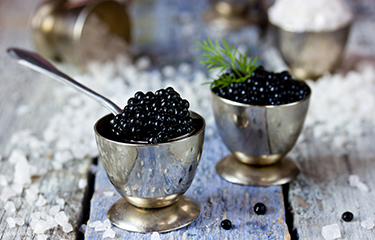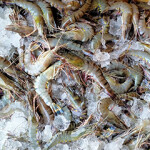Russia hopes to crack down on falsely labeled black caviar

Russia intends to make black caviar a more significant source of export revenue, but it is facing what it calls unfair competition from falsely labeled imports at home, which is both decreasing the income of local producers and creating a warped perception of the product among consumers, according to the Russian government.
Russia annually produces around 40 metric tons of black caviar derived from sturgeon. After the introduction of a fishing ban on sturgeon in the Caspian Sea, in line with the Convention on International Trade in Endangered Species, the product has become a delicacy costing a fortune for the average Russian: RUB 4,800 (USD 75.12, EUR 68.35) for 100 grams, compared to the average monthly salary in the country of RUB 37,000 (USD 579.16, EUR 527.00).
Since the fishing ban in 2007, black caviar can only be harvested in aquaculture farms, limiting the supply. Currently, the product is only produced at 80 farms in Russia.
Russian black caviar is a world-known brand, and that’s where the biggest problem emerges. Cheaper products, imported from China, are intentionally mislabeled as having been produced in Russia and then sold for what Russian-harvested caviar costs.
Alexander Novikov, president of the Russian Sturgeon Union and the owner of the Russian Caviar House, claimed in an article in Fishery and Aquaculture magazine that Chinese-origin black caviar is often of poorer quality.
Chinese producers, Novikov wrote, save money on fish nutrition by using cheaper, lower-quality feed, and by replacing nutritional components used in Russia and Europe with substitutes that have inappropriate nutritional value or are even harmful to the fish.
“China-produced black caviar cannot provide even 10 percent of the range of flavors and aromas which Russia-produced caviar can give. Chinese product often tastes as ooze, its taste is very simple,” Yan Korolev, director of Art Caviar, St. Petersburg, Russia-based restaurant, told SeafoodSource. “Unfortunately, every third caviar open sandwich in Russia is covered with Chinese-origin black caviar. It happens even at top restaurants. This results in visitors’ disappointment as they think they are eating an authentic Russian product, and this can result in publications in foreign media that the Russians fail at dishes with black caviar.”
He said some guests at Art Caviar have been reluctant to taste the product, claiming that their previous caviar experiences had not brought them much pleasure.
“They were very surprised after they tasted the real Russian caviar,” Korolev said.
According to the estimates of the Russian Federal Agency for Fisheries, mislabeled black caviar of Chinese origin represents nearly one-third of what is consumed nationally in Russia, the agency’s deputy head Vasily Sokolov said during his meeting with Russian parliamentary representatives in early this year. The volume of the mislabeled products has increased four times over the last three years, and is now at about 18 MT, a significant portion of the amount available in the market.
Chinese caviar costs only USD 200 (EUR 182) per kilogram in wholesale trade, while the cost of Russia-produced caviar is USD 600 (EUR 546), and it costs even more on the shelf.
“The problem has been getting more and more serious from year to year,” Sokolov said.
That price gap is a real temptation for even the legal Russian farmers. Novikov claimed some aquaculture sturgeon farms add the imported product to their own and sell it as a completely domestic product to enjoy bigger profits.
The seafood industry and government have a clear plan on what to do to tackle the illegal schemes: Track the origin of products. As part of the plan, market players have decided to introduce barcoding procedures, whereby consumers can track the origin of caviar with the help of a mobile app just before purchase at a shop. The Fishery Agency will also strengthen its supervision over the farms to prevent adding Chinese caviar into locally harvested products.
“Barcoding is an effective tool to tackle the problem of counterfeit caviar and secure the consumers’ rights,” Ilya Shestakov, head of the Russian Federal Agency for Fisheries, said in an interview with TASS news agency. “Producers are now in negotiations with a company charged by the government to implement barcoding in Russia about packaging and marking their products.”
This barcoding company is the Moscow-based Center for Development of Prospective Technologies (CDPT). The company has also designed tobacco barcoding systems, CDPT’s deputy head Revaz Yusupov said, which can be easily adapted for use in seafood.
The adaptation, he said, will not require considerable increase in prices; the average cost of barcoding one item is just RUB 0.5 (USD 0.01, EUR 0.01). The cost of barcoding for black caviar will be established by the Russian government, but it will likely be a negligible amount for shoppers who can afford caviar’s high price.
According to Novikov, at first, barcoding will be purely voluntary measure, starting with a few farms which will be publishing the data of origin on their products. The experiment is to start this year, and after a year, the Fishery Agency will evaluate the results of the pilot to decide whether barcoding must be extended across the segment and become obligatory for all the producers, Shestakov said.
Shestakov said that barcoding will bring many other benefits to both the industry and regulators. Police and other supervisory bodies will be able to confiscate counterfeit products without the need to first contact the Fishery Agency for verification. Currently, the agency is not able to response immediately to claims of counterfeit caviar, as it needs to conduct time-consuming and costly research to check whether the product in question is illegal or mislabeled.






Share